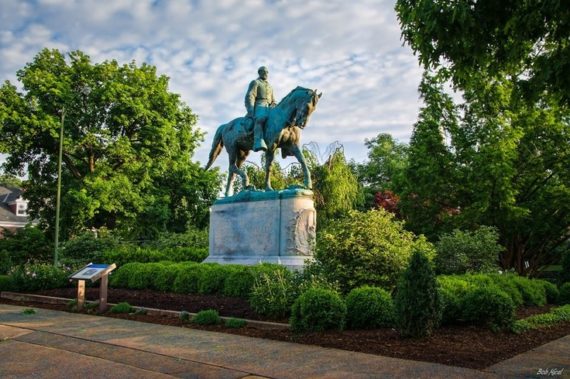Early in February, the City Council of Charlottesville, Virginia voted 3-2 to remove a bronze equestrian monument to Robert E. Lee that stands in a downtown park named in his honor. Vice Mayor Wes Belamy, the council’s only African American member, led the effort to remove the statue. In the end, this vote may be largely symbolic. Those opposed to the statue’s removal intend to file a lawsuit and point to a state statute that says Virginia cities have no authority over the war memorials they inherited from past generations. “If such are erected,” the law reads, “it shall be unlawful for the authorities of the locality, or any other person or persons, to disturb or interfere with any monuments or memorials so erected.”
The attack on the Robert E. Lee statue is, in reality, an attack on American history itself. It has been suggested that the Washington Monument and Jefferson Memorial are inappropriate, since they celebrate men who owned slaves. Those who seek to erase our history sound a bit like the Taliban and ISIS, who are busy destroying historic structures all over the Middle East if they predate the rise of Islam. History is what it is, a mixed bag of mankind’s strengths and weaknesses, of extraordinary achievements and the most horrible depredations. To judge the men and women of past eras by today’s standards is to be guilty of what the Quaker theologian Elton Trueblood called the “sin of contemporaneity.”
Those who refer to slavery as America’s “original sin” should review history. Sadly, from the beginning of recorded history until the 19th century, slavery was the way of the world. When the U.S. Constitution was written in 1787, slavery was legal everyplace in the world. What was unique was that in the American colonies there was a strenuous objection to slavery and that the most prominent framers of the Constitution wanted to eliminate it at the very start of the nation.
Our Judeo-Christian tradition, many now forget, accepted the legitimacy of slavery. The Old Testament regulates the relationship between master and slave in great detail. In Leviticus (XXV: 39-55), God instructs the Children of Israel to enslave the heathen and their progeny forever. In the New Testament, St. Paul urges slaves to obey their masters with full hearts and without equivocation. St. Peter urges slaves to obey even unjust orders from their masters.
At the time of its cultural peak, ancient Athens may have had 115,000 slaves to 43,000 citizens. The same is true of Ancient Rome. Plutarch notes that on single day in the year 167 B.C., 150,000 slaves were sold in a single market. The British historian of classical slavery, Moses I. Finley, writes: “The cities in which individual freedom reached its highest expression—most obviously Athens–were cities in which chattel slavery flourished.”
American history is flawed, as is any human enterprise. Yet those who now call for the removal of statues and monuments commemorating our past are measuring our history against perfection, not against other real places. What other societies in 1787—or any date in history prior to that time–would these critics find more free and equitable than ours? Where else was religious freedom to be found in 1787? Compared to perfection, our ancestors are found wanting. Compared to other real places in the world, they were clearly ahead of their time, advancing the frontiers of freedom.
In the case of Robert E. Lee himself, there is more to his story than the Charlottesville City Council may understand. Everyone knows that Lee’s surrender to Ulysses S. Grant at Appomattox effectively ended the Civil War. What few remember today is the real heroism of Robert E. Lee. By surrendering, he was violating the orders given by Jefferson Davis, the elected leader of the Confederacy. The story of April 1865 is not just one of decisions made, but also of decisions rejected. Lee’s rejection of continuing the war as a guerrilla battle, the preference of Jefferson Davis, and Grant’s choice to be magnanimous, cannot be overestimated in importance.
With the fall of Richmond, Davis and the Confederate government were often on the run. Davis, writes Prof Jay Winik in his important book April 1865: The Month That Saved America : “…was thinking about such things as a war of extermination…a national war that ruins the enemy. In short, guerrilla resistance…The day after Richmond fell, Davis had called on the Confederacy to shift from a conventional war to a dynamic guerrilla war of attrition, designed to wear down the North and force it to conclude that keeping the South in the Union would not be worth the interminable pain and ongoing sacrifice.”
But Robert E. Lee knew the war was over. Grant was magnanimous in victory and, Winik points out, “…was acutely aware that on this day, what had occurred was the surrender of one army to another–not of one government to another. The war was very much on. There were a number of potentially troubling rebel commanders in the field. And there were still some 175,000 other Confederates under arms elsewhere; one-half in scattered garrisons and the rest in three remaining rebel armies. What mattered now was laying the groundwork for persuading Lee’s fellow armies to join in his surrender—and also for reunion, the urgent matter of making the nation whole again.”
Appomattox was not preordained. “If anything,” notes Winik, “retribution had been the larger and longer precedent. So, if these moments teemed with hope—and they did—it was largely due to two men who rose to the occasion, to Grant’s and Lee’s respective actions: one general, magnanimous in victory, the other gracious and equally dignified in defeat, the two of them, for their own reasons and in their own ways, fervently interested in beginning the process to bind up the sounds of the last four years…Above all, this surrender defied millenniums of tradition in which rebellions typically ended in yet greater shedding of blood…One need only recall the harsh suppression of the peasants’ revolt in Germany in the 16th century, or the ravages of Alva during the Dutch rebellion, or the terrible punishments inflicted on the Irish by Cromwell and then on the Scots after Culloden, or the bloodstained vengeance executed during the Napoleonic restoration, or the horrible retaliation imposed during the futile Chinese rebellion in the mid-19th century.”
If it were not for Robert E. Lee’s decision not to blindly follow irrational instructions to keep fighting a guerrilla war indefinitely, the surrender at Appomattox never would have taken place and our nation’s history would have been far different. Fortunately, our American tradition has never embraced the notion of blindly following orders, particularly if they involved illegal or immoral acts. No American could ever escape responsibility for such acts by saying, “I was simply following orders.”
The effort to erase our past, as the Charlottesville City Council proposes, comes about, in large part, because we know so little about our own history. Pulitzer Prize winning historian David McCullough declares that, “We are raising a generation of people who are historically illiterate. We can’t function in a society if we don’t know who we are and where we came from.” More than two thirds of college students and administrators who participated in a national survey were unable to remember that freedom of religion and the press are guaranteed by the Bill of Rights. In surveys conducted at 339 colleges and universities, more than one-fourth of students and administrators did not list freedom of speech as an essential right protected by the First Amendment.
If we judge the past by the standards of today, must we stop reading Plato and Aristotle, Sophocles and Aristophanes, Dante and Chaucer? Will we soon hear calls to demolish the Acropolis and the Coliseum, as we do to remove memorials to Washington and Jefferson, and statues of Robert E. Lee? Must we abandon the Bible because it lacks modern sensibility? Where will it end? As theologian Elton Trueblood declared, “contemporaneity” is indeed a sin. We would all do well to avoid its embrace.”







